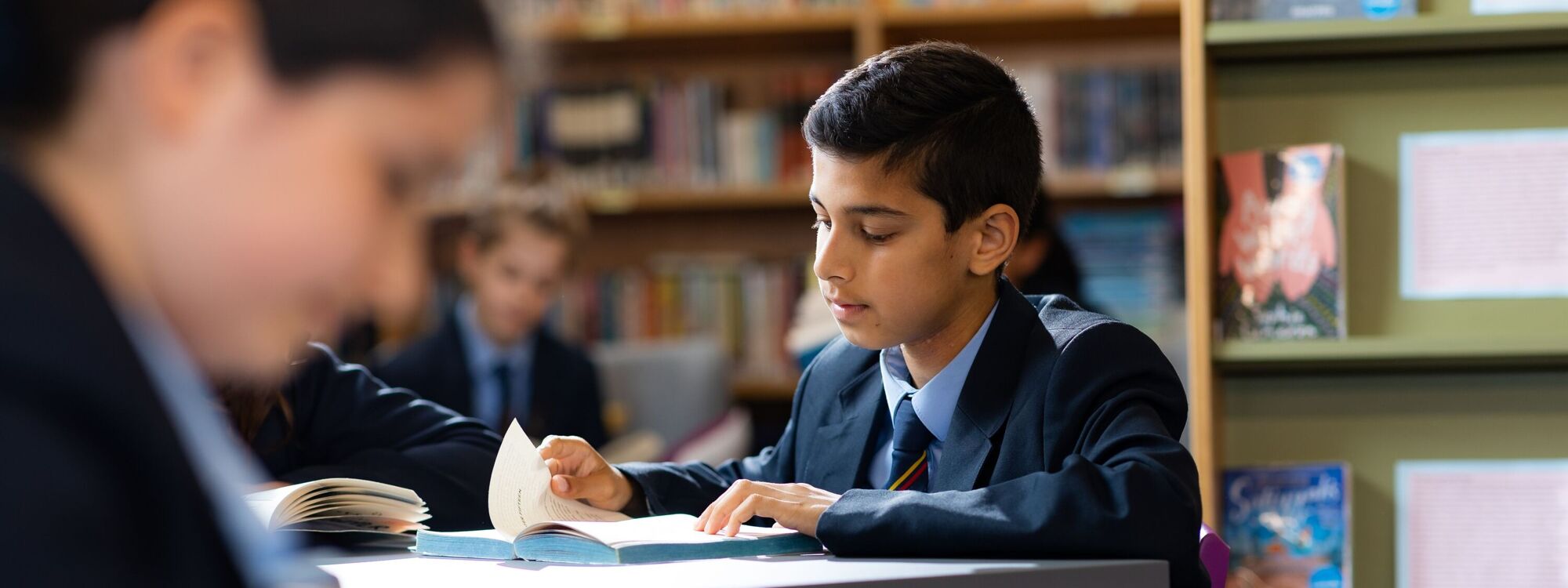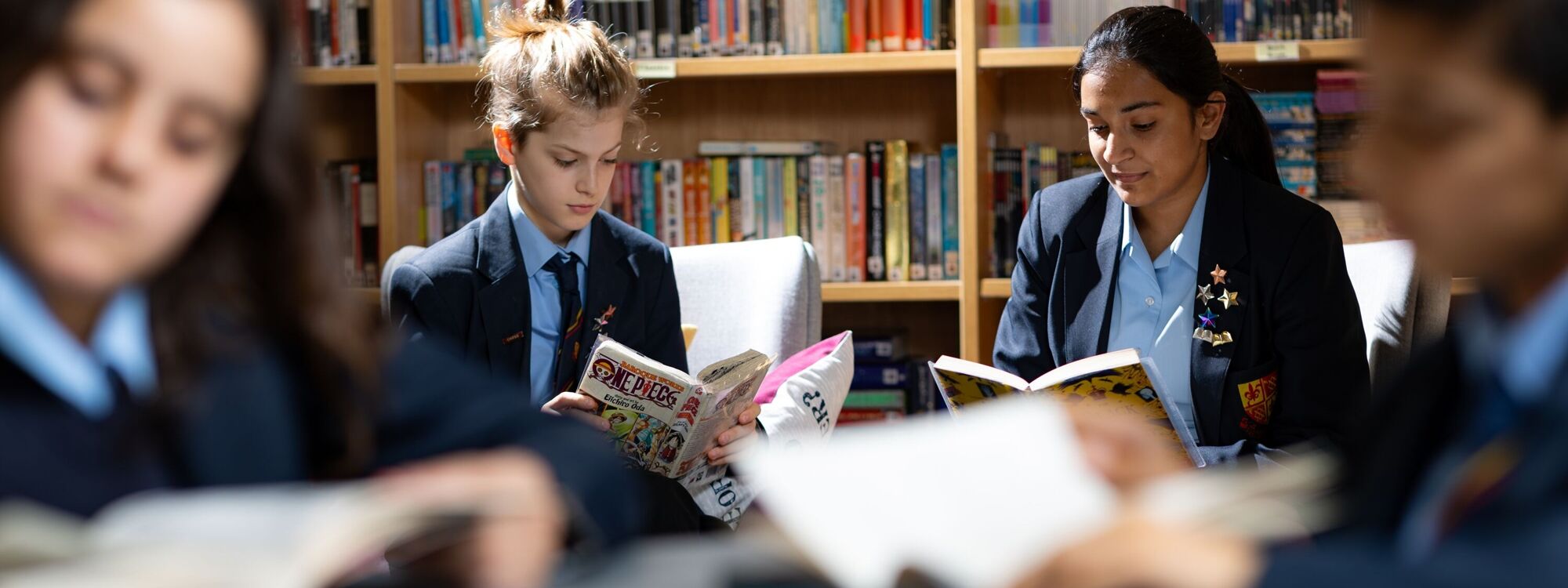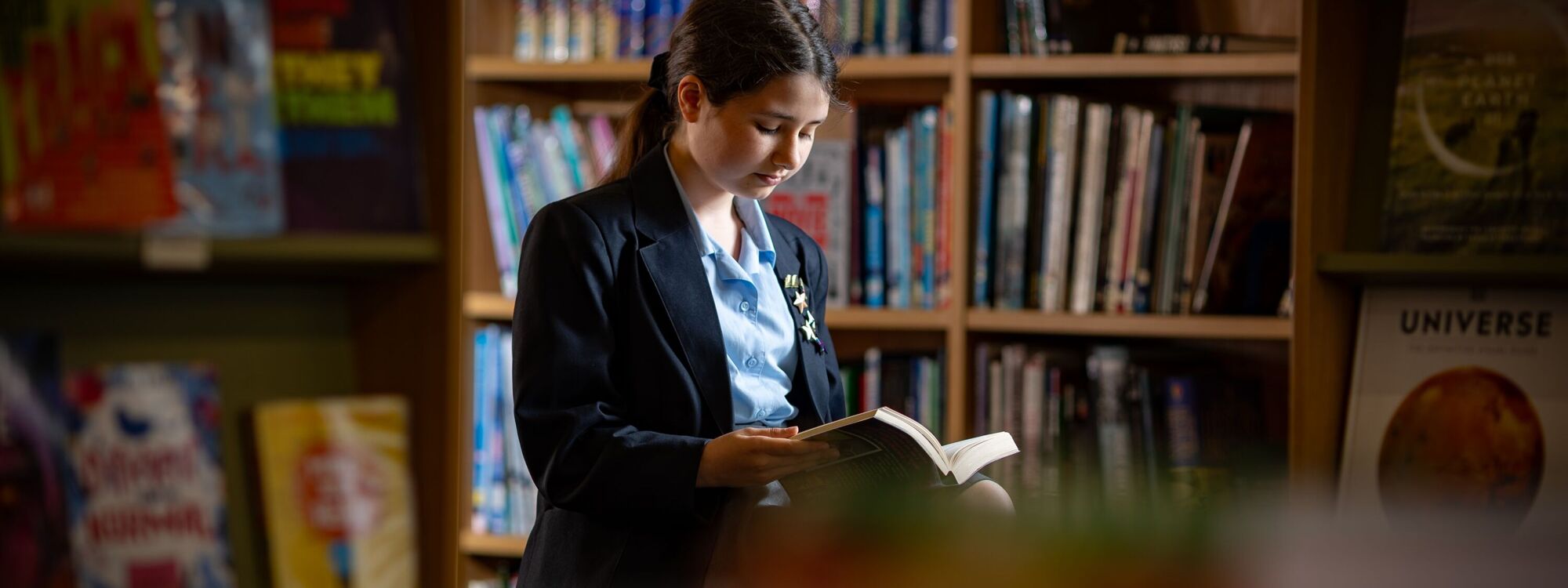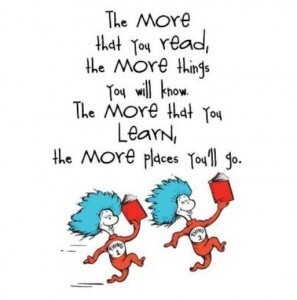


- Home
- Curriculum
- Literacy and the Library
Literacy and the Library
“The more that you read, the more things you will know. The more that you learn, the more places you’ll go.” Dr Seuss
A very warm welcome to Woking High School’s Library – a calm, yet purposeful space where reading for pleasure is championed and encouraged. The library is staffed by a full-time librarian, supported by student librarians and D of E volunteers, and is open for reading, studying, library lessons and other activities from 8.15am to 4.15pm daily with the exception of Fridays when the library is open until 1:10pm. There are extra-curricular activities held in the library such as book groups, chess and D of E volunteering; Reading for Pleasure lessons are timetabled throughout the week.
Students may borrow up to three books for two weeks to enjoy and read at home and all students should have something enjoyable to read in their bags at all times.
Why read for pleasure?

Research shows that reading for pleasure has a direct and positive impact on the social, educational and mental health outcomes of our young people. A fluent reader will be able to access the curriculum more easily, therefore improving their understanding and achievement in these areas. In the long term, this means better exam results and career choices. Reading a range of texts broadens our experiences and helps us to develop empathy required to understand the variety of situations our fellow humans are living with daily. Readers can recognise themselves in books and may feel that they are being understood and can find connections. Reading for pleasure can create calm in an otherwise busy and sometimes chaotic life, providing a brief “holiday” or escape by appealing to our imaginations. Reading is a lifelong skill and learning to read and fully comprehend texts does not end at primary school. There are so many reasons why reading for pleasure is a great idea … why would you not?!
How does the library support Reading for Pleasure?
♦ By ensuring the books and magazines are current with new titles being added to the collection constantly and that suggestions are taken from our students – it’s their library.
♦ Ensuring that all levels of reading ability and needs are provided for in our resources, e.g. braille, large print, dyslexia-friendly. Classic novels, LGBTQ+ novels, books celebrating diversity, non-fiction books that support our curriculum, graphic novels, self-help books and books about mental health, a fiction section ordered into genres for easy choosing, books that are popular on social media e/g/ TikTok, books that are now on television and so on.
♦ By having a full-time librarian who is always available to recommend books and help students choose books they’ll be interested in. The librarian meets termly with other librarians to discuss current good practise and regularly attends training courses.
♦ By having reading for pleasure lessons in the library where students have the opportunity to look at new and recommended books, share what they are reading, browse and borrow from our vast collection, listen to books being read aloud, share a book together as a class, take book quizzes, study aspects of reading such as authors and illustrators, read for a sustained period of time and so on.
♦ By celebrating the yearly calendar of events and sharing related books and displays e.g. World Book Day, Black History Month, International Women’s Day, various religious festivals, STEM week, Science Week and so on
♦ By holding author events in the library and on our Aspire To Be days – we have had Patrice Lawrence, Chris Priestley and a self-published ex-pupil author Rachel.S.Porter in to school recently and an online author event with Tom Palmer.
♦ By working closely with the English team and other departments to ensure resources match and support curriculum learning.
♦ By giving all Y7 student a choice of their own book to take home and keep with the Book Buzz initiative.
♦ There are always activities and competitions running in the library to engage and keep students interested in reading and the world of books.
Useful links:
Reading lists
At Woking High School, we encourage free reading choices but will guide students using their interests, maturity, reading ability and suitability of books as a guide. We run initiatives to read a range of genres and text-types to expand their reading experiences as well as using library lessons to share new and current books ready to be borrowed.
Recommended Reading Lists
New books and authors are being published continually. We try to ensure the books in the library are as current as possible but reading lists will change over time. This website updates and revises reading lists regularly, and is a helpful place to start! It’s not exhaustive so please do ask our librarian, English team and other staff for recommendations too.
“The School Reading List is curated and reviewed by a small group of librarians, English teachers and parents who meet in school holidays to discuss books that have worked well with groups of children, new releases within the last 12 months and the shortlists for children’s literature awards. Our reading book lists are reviewed and revised monthly.”
How to choose books
Nothing beats actually picking up a book and being drawn in by the cover and synopsis so taking trips to libraries and bookshops is one of the most effective way to encourage reading. Adults and student-peers can be a great source of recommendation including staff at school and family members – readers want to know if a book has been tried and tested before investing time in one, especially with all the distractions in today’s busy world!
Young people find social media a great source of inspiration too with websites such as TikTok, YouTube, Good Reads and Instagram recommending new and classic literature. Caution may be needed for younger students with some of these recommendations as content may be quite mature.
The following websites are helpful for assisting with book choices:
https://www.lovereading4kids.co.uk/
https://www.surreycc.gov.uk/libraries
https://readforgood.org/book-recommendations/older-readers/
https://shop.scholastic.co.uk/
https://www.thereaderteacher.com/bookmatch
https://www.booktrust.org.uk/books-and-reading/bookfinder/
For developing readers or for dyslexia-friendly texts
https://www.barringtonstoke.co.uk/dyslexic-reluctant-readers/
Audiobooks (some free, some with a subscription)
https://www.worldbookday.com/world-of-stories/ Scroll further down the page for fluent reader audiobooks
https://harpercollinschildrensbooks.co.uk/listen-for-free/
Audible, BBC Sounds and Spotify apps both have audio books.
For further information or support, contact our librarian, Mrs Carlton.
Ideas for supporting your child with reading at home during their time at secondary school
Continuing to encourage and support your child with their reading in secondary school is just as important as during all their years in primary, if not more so. In secondary, there are more subjects being taught and with that more technical and subject-specific vocabulary which needs to be checked for understanding. There are so many educational and emotional benefits to reading for pleasure (as previously discussed) but also, a child’s reading age and fluency is still increasing during secondary years – they don’t know it all by the end of Y6. Everyone learns to read at a different pace so good reading habits are essential. Being supported at home with reading makes a huge difference to a child’s education whether English is the family’s first language or not or if reading is not strong at home, the encouragement is sometimes all it takes.
Tips for reading at home
♦ Create a reading routine – a time daily for reading silently, together, aloud or all three!
♦ Model reading for pleasure yourself.
♦ Encourage reading aloud – it could be a book, letter, email, some homework, a recipe, a shopping list – anything that you can listen to in order to gain an insight into ability and any issues that may arise.
♦ Find out what interests your child has and encourage reading around these interests e.g. a magazine subscription.
♦ Read some books written for teens. Young adult novels can give you valuable insights into the concerns and pressures felt by teenagers and provide an opportunity to discuss them together.
♦ Read through any homework tasks and completed homework together.
♦ Build up your child’s vocabulary bank – help them to learn new specialist words and how to use them correctly.
♦ Share book recommendations with each other.
♦ Visit the school or local library – books are updated continuously to include the latest publications as well as non-fiction, dyslexia-friendly books and graphic novels. Let your child choose as they need to be interested in what they read.
♦ Use suggested reading lists to guide them with their choices e.g. https://schoolreadinglist.co.uk/category/secondary-ks3-ks4-reading-lists/
♦ Browse your local book shop or online book retailer. Use social media or ask the bookseller to hunt out the popular (appropriate) books everyone is reading! Use book tokens as gifts/rewards.
♦ Read a range of reading materials as they will be using these in school too e.g. newspaper reports, scientific explanations, nutritional information, letters, directions, internet searches, etc.
♦ Chat about what they are learning about in school and any reading material they are using in lessons. There will be key texts in most subject areas.
♦ Take part in reading competitions and challenges for fun.
♦ Learn some quotations together – make it a competition e.g. who can learn the most quotes from Macbeth or another English curriculum text?
♦ Read the book then watch the film (if there is one) – discuss similarities, differences and preferences.
For more ideas and advice:
https://youtu.be/XtxpJRlKOf8 - encouraging your teen to read
https://www.adlit.org/topics/parent-tips/how-parents-can-encourage-teens-read
